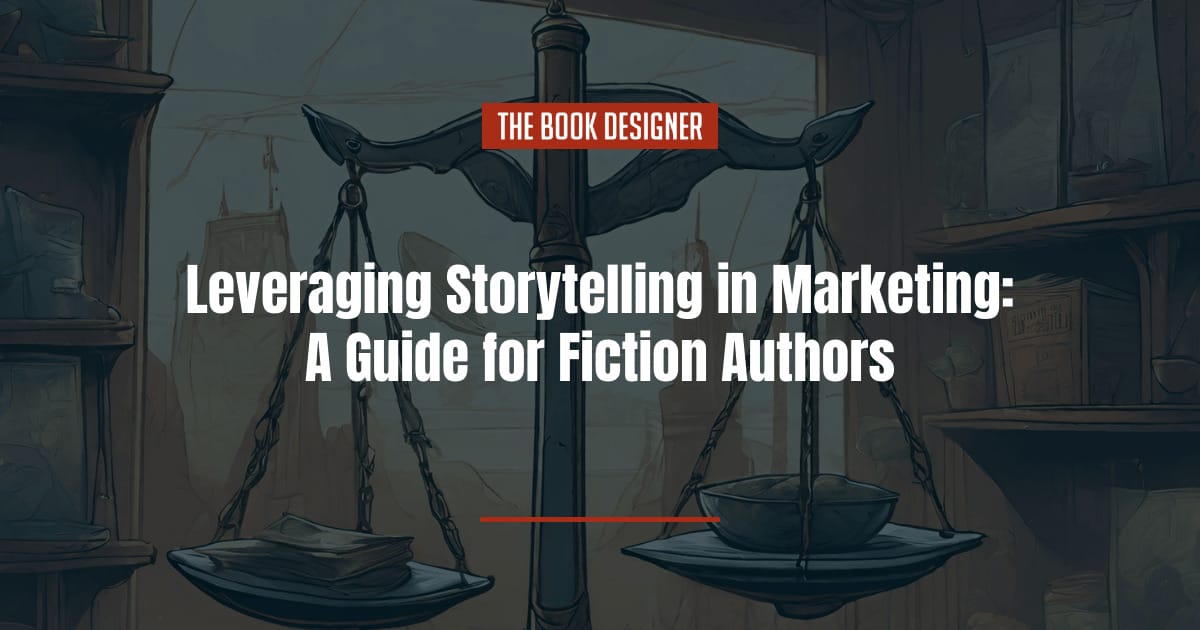In the realm of fiction authors, the task of promoting one’s work often ranks low on the list of enjoyable activities. The myriad of marketing responsibilities can appear daunting and unfamiliar. Many authors grapple with a sense of inadequacy, either due to limited knowledge or a lack of confidence. This is compounded by the pressing need to achieve sales to be successful.
However, it’s heartening to know that the perceived challenges of marketing are often more daunting than the actual task. Holding an MBA is not a prerequisite for marketing success. In fact, as a fiction author, you possess a significant advantage—your proficiency in storytelling.
Indeed, it’s a crucial realization: being adept at crafting compelling stories inherently enhances your marketing skills. Your experience in storytelling doesn’t just contribute to creating a superior product; it also empowers you to market it effectively. The art of storytelling in marketing is a powerful tool, enabling authors to connect with their audience, convey the essence of their work, and stand out in a crowded market.
Harnessing the power of storytelling in marketing is about more than just narrating a plot; it’s about engaging the audience, creating relatable characters, and evoking emotions that resonate with readers. This skill is invaluable in marketing, as it allows authors to create compelling narratives around their books, draw in potential readers, and build a loyal fanbase.
By embracing storytelling in marketing, fiction authors can transform their promotional efforts from a dreaded chore to a creative extension of their literary art. It’s not just about selling a book; it’s about sharing a story that captivates and inspires, creating a lasting impact on the audience.
In conclusion, for fiction authors, the journey of marketing can be reimagined through the lens of storytelling. This approach not only makes marketing more approachable but also more effective, leveraging the innate storytelling skills of authors to create a unique and powerful connection with their audience.
Here’s what you need to know about leveraging storytelling in marketing as a novelist:
Storytelling in Marketing: Targeting the Right Readers
In the world of storytelling and marketing, not every reader will resonate with the unique perspective and world you’ve crafted in your words. And that’s perfectly okay. In fact, it’s desirable.
This selective appeal is a strength. Your writing is a reflection of you and is meant to connect with readers who share your sensibilities. Worrying about those who don’t appreciate your style is unnecessary and unproductive.
This principle is equally important in marketing, particularly in the digital realm where the potential audience is vast. The idea of reaching everyone with internet access may seem tempting, but in reality, “everyone” is not an effective target, especially when resources are limited. Focusing your marketing efforts on those who are passionate about the kind of fiction you write is far more beneficial.
When advertising or guest posting on other blogs, aim for the largest audience that is likely to engage deeply with your work. It’s crucial to remember that a reader who loves your stories is far more valuable than one who merely likes them.
Finding the perfect match for your stories is a journey without explicit directions. However, you have the power to be discerning about where you invest your efforts. This approach not only ensures a more engaged readership but also aligns your marketing strategies with the essence of your storytelling. By understanding and embracing this selective nature, you can make your marketing as impactful and authentic as your stories, connecting deeply with an audience that truly appreciates your narrative.
Crafting a Cohesive Narrative in Writing and Marketing
In the realm of storytelling, conveying a major concept requires more than a passing mention. Consider, for instance, an evil character in your novel. To effectively communicate their malevolence, a mere sentence won’t suffice. You’d likely utilize a blend of the character’s dialogue, actions, thoughts, and perhaps their past to paint a vivid picture of their wickedness. Additionally, the reactions and perceptions of other characters can help flesh out this portrayal. Using multiple elements in this way ensures the idea is thoroughly and clearly communicated to the reader.
This principle of reinforcing a central idea from various perspectives makes it easier for readers to grasp and remember the core message. The details you choose to highlight are crucial in strengthening the overarching theme.
This concept of storytelling can be effectively applied to your marketing efforts as well. Although you cannot control the final perception of your work, you can significantly influence it by the manner in which you present all aspects of it. Your online presence, email newsletters, and behavior are all integral parts of this narrative.
For example, if you specialize in horror stories, opting for darker color schemes on your author website can subtly reinforce the genre. Similarly, the content on your landing page should be carefully curated to support your main offer.
Interactions with your fans are equally important. Consistently treating them well—not just when it suits you—helps establish your reputation as a considerate and respectful author.
Having a compelling core idea is just the beginning. The key to success, both in writing and marketing, lies in telling a consistent, cohesive story that resonates with and captivates your audience. This consistency is what makes your narrative—and by extension, your brand—memorable and impactful.
The Power of Compelling Beginnings in Storytelling and Marketing
The opening of your story holds immense power, a concept famously emphasized by Stephen King. He articulates that the beginning serves as an introduction, setting the stage for your narrative and showcasing your unique writing style. More importantly, King suggests that an effective beginning essentially beckons the reader, inviting them with the promise: “Listen. Come in here. You want to know about this.”
This initial engagement is critical. If the reader isn’t immediately drawn in, the remainder of your story risks being overlooked, regardless of its quality. This principle is equally applicable to your marketing strategies.
Consider the importance of a visually striking book cover. It’s not just an aesthetic element; it’s an integral part of capturing potential readers’ attention. Similarly, crafting compelling headlines for your blog posts, social media links, and email subject lines is vital. These elements are your first point of contact with your audience and can determine whether they engage further with your content.
It’s not necessary to start with a bang or aim for universal appeal. The objective is to captivate the right audience, those who are most likely to appreciate and engage with your work. Hooking this specific demographic effectively gives your story the chance to be heard and appreciated. In essence, the art of creating a strong opening in both your storytelling and marketing efforts is about making a memorable first impression that resonates with your intended audience, compelling them to delve deeper into the world you’ve created.
Maintaining Engagement: A Key in Writing and Marketing
Securing a reader’s attention with your book is an initial triumph, but it’s just the beginning. Readers’ engagement is not guaranteed throughout the entirety of your story. At any point, their interest may wane, and it’s your responsibility to ensure this doesn’t happen.
Managing the pacing of your narrative is crucial. Identifying moments to escalate suspense and introducing the right degree of conflict are essential techniques to keep readers hooked. This ongoing engagement is just as important in your marketing endeavors.
When it comes to the content of your landing pages or a series of blog posts, sustaining a reader’s attention from start to finish is vital. This involves understanding and addressing the reader’s interests, ensuring that each piece of content is engaging and leads smoothly to the next. It’s about presenting an enticing lure that keeps the reader moving forward without disappointment.
The skill of persuading someone to eagerly turn the page is a defining attribute of both a successful writer and an effective marketer. This ability to maintain a reader’s interest not only reflects the quality of your writing but also the effectiveness of your marketing strategy. Keeping your audience continually engaged, whether through a captivating story or compelling marketing content, is essential for building a loyal and enthusiastic following.
Embracing the Essentials in Writing and Marketing
The journey to becoming a skilled writer or marketer begins with mastering the fundamentals. While many can attempt to write a story, crafting a compelling one requires more than just the aspiration to be published. A deep understanding of the basics of quality fiction writing is essential. This includes a grasp of story structure, character development, and the art of integrating descriptive narrative and dialogues effectively.
Similarly, in the world of marketing, there are foundational principles that have consistently proven successful across various business contexts. These include strategies like actively engaging with your audience and forming collaborative partnerships.
The distinction between an amateur and a professional writer extends beyond monetary gain. It lies in the depth of their dedication to honing their craft. The same principle applies to marketing. To aid in this journey, The Book Designer offers a wealth of free articles in its marketing archives, providing guidance and insights to aspiring writers and marketers.
Investing time and effort in understanding and applying these fundamental principles in both writing and marketing is invaluable. It not only enhances the quality of your work but also sets the foundation for a successful and fulfilling career in these fields.
*Editor’s note: This article was originally written by Jason Kong in 2015 and has been updated and rewritten by The Book Designer editorial team.




